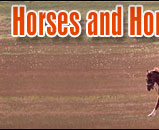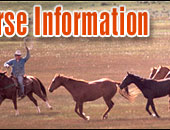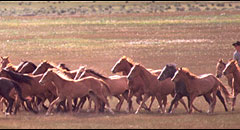 |
   |
|
|
|
You are here: Horses > Horse breeding > Care for the orphan foal |
The Orphaned Foal:
Proper Care and Nutrition for a Newborn Horse Without a Mare's Milk
A foal may become an orphan in many ways, and not all of
them are permanent. The death of its mother, rejection, or
lack of milk production is common reasons a foal might not
be able to be nursed by its dam. |
|
|
Temporary situations, such as the dam’s illness or being
shipped away for breeding without the foal, can also result
in a briefly orphaned foal.
The age of the foal when it is orphaned is the key in
determining how it should be cared for. A newborn foal or
one under three months of age will need foster care. This
can be provided by hand-rearing by the owner, which requires
a great deal of time and energy, or by using a nurse mare. |
All foals orphaned or not, need their immunoglobulin status
checked within twelve to fourteen hours after birth. You can
use a commercial kit for this, as they are reliable. An
antibody concentration of 400-800 mg/dl or higher shows that
passive immunity transfer has occurred.
Four to twelve hours from birth, foals usually nurse
colostrum from their dam. They can also be bottle-fed a
colostrum replacement or, if the foal is too weak to nurse
from a bottle, can have it administered by the veterinarian
via nasogastric tube. Another option is to contact a
colostrum bank. The colostrum is good for at least a year if
it remains frozen, and these banks store it for orphaned
foals. If it is doubtful whether the foal has received any
colostrum, the veterinarian will usually give the foal an
intravenous bolus of plasma. Confirming the immunoglobulin
status of foals is a vital step that should never be skipped
or overlooked.
Ideally, an orphaned foal should be adopted by a nurse mare.
This allows the foal to grow on its normal diet of mare’s
milk, as well as experiencing normal socialization. After
the foal has bonded with the nurse mare, there is no
additional labor to the normal care and feeding of the foal.
Commercial nurse mare managers are experts at facilitating
this bonding process. However, their expertise does not come
cheap. The added expense, $800 to as much as $1500 for a
six-month lease, can be more than the value of the foal. If
leasing a nurse mare is impractical, the only other
alternative is to hand-feed the foal.
Bottle feeding a foal is not risk-free. If the foal’s head
is held too high, or if the foal lies flat while feeding,
milk can run down the trachea into the foal’s lungs. This
can cause aspiration pneumonia, which can be fatal if not
quickly diagnosed and treated. A foal that is lying flat
should never be bottle-fed. It should be fed standing, or
braced between your knees, with the bottle held so that the
foal’s nose does not rise above its eye level.
A safer and easier method is to teach the foal to drink milk
from a bucket.
To do this, don’t feed the foal for four hours. This ensures
it will be hungry. Pour the warm milk or milk replacement
into a shallow pan or small bowl to begin with. Push the
foal’s muzzle into the pan or bowl, and use your fingers in
its mouth to stimulate its sucking reflex. It may take
several attempts for the foal to catch on, so be patient,
and make sure that the foal doesn’t go too long without
food.
Newborn foals under five days old require feeding every two
hours. This tight schedule can gradually be expanded, and
the amount fed can be increased, until the foal is eating
every six hours by seven to ten days of age. Foals should be
offered grain and hay as soon as they seem to be interested
in them.
If the foal is already eating solid food when it is
orphaned, it can be fed milk replacement pellets so long as
it is drinking enough water. Clean, fresh water should
always be available, and a loose mineral supplement should
be used.
Set up a vaccination and worming schedule with your
veterinarian. Whatever their age, foals need shelter in hot
or cold weather.
It is important for orphaned foals to spend time with other
horses to learn how to behave around other horses socially.
While the foal’s playful behavior with humans is cute when
they’re little, it can become dangerous when they are grown.
Orphans do well when raised with other orphans, or if they
have a quiet adult horse or pony for a companion. Also,
orphan foals do well when they are turned out with the other
weanlings. These things help to raise that orphan colt into
a well-socialized adult horse.

|
Read the next horse breeding article on
What to Expect. |
|
|
|
|
 |
|
|
 |
 |
  
Visit Equestrian Cupid now.
The best and largest equestrian club for meeting the other half for friendship and marriage
|
|
 |
|
|
|
Horse Education
|
|
|
|
|
Horse Information Topics
|
|
|
|
|
|
|
|
Horse Business Owners
|
| |
Advertise with Us
Have your horse products or services exposed to over 27,000 of our monthly visitors.
|
|
|
|
|
|